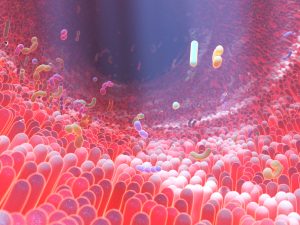The Luxembourg Centre for Systems Biomedicine (LCSB) and the Department of Life Sciences and Medicine of the Faculty of Science, Technology and Medicine of the University of Luxembourg, the Luxembourg Institute of Health (LIH) and the Luxembourg Institute of Science and Technology (LIST) launch a new doctoral training unit (DTU) funded within the PRIDE framework of the Luxembourg National Research Fund (FNR). The programme of this DTU, called MICRO-PATH and comprising 16 PhD positions over the course of 6 years, aims to investigate the causal and mechanistic links between the human microbiome and chronic diseases. Aligned with Luxembourg’s and the respective research institutes’ research priorities, especially personalised healthcare, MICRO-PATH will address microbiome-driven impacts of environmental, lifestyle, and socio-economic factors on disease mechanisms.
Exploring host-microbiome interactions and disease mechanisms
The human microbiome consists of trillions of microorganisms that live on our body surfaces, including those lining the gastrointestinal tract. Aiding in digestion, boosting the immune system, and protecting against harmful pathogens, these microbes play a crucial role for our health. Imbalances in the microbiome have been linked to the onset and progression of several chronic diseases, highlighting the importance of the complex interactions between these microorganisms and their human host. By leveraging Luxembourg’s world-leading expertise in microbiology, immunology, systems biology, and microbial pathogenesis, the new DTU aims to better understand how microbial features contribute to diseases such as Alzheimer’s, food allergy, colorectal cancer, and metabolic syndrome.
“With MICRO-PATH, we want to go beyond observational studies to truly understand the causality and mechanisms at play,” explains Prof. Paul Wilmes, coordinator of the DTU and head of the Systems Ecology group at the LCSB. “I am convinced that the interdisciplinary nature of the programme will help us to address these complex interplays.”
Cutting-edge research and innovative techniques
Doctoral candidates in the MICRO-PATH DTU will work on both human cohort studies and mouse models to identify and verify microbiome-associated features that may be causal in disease pathogenesis. Advanced methodologies such as mass spectrometry and in silico techniques will be used to discover novel microbial biomolecules with pathogenic potential.
Prof. Mahesh Desai, co-coordinator of the DTU and group leader of Nutrition, Microbiome and Immunity group at the LIH, emphasises the programme’s potential: “By integrating different scientific disciplines and taking advantage of the state-of-the-art research infrastructure, we are creating a robust framework that can yield significant insights and innovations in microbiome research. This will not only advance our understanding but also potentially lead to new therapeutic strategies.”
Building on previous successes and training the next generation of scientists
This new initiative builds on the success of MICROH, a previous FNR PRIDE-funded DTU coordinated by Prof. Wilmes, which will end in October 2024 after successfully training 17 young researchers, some of which are now pursuing academic careers in well-known international research institutions. While MICROH successfully generated important datasets in microbiome research, the goal of MICROH-PATH is to leverage these data further into carefully designed causal and mechanistic studies to realize the therapeutic potential of the microbiome in various diseases. “DTUs are characterised by a comprehensive approach designed to foster collaboration between all research players in the country,” says Prof. Desai. “With MICROH we have seen already that the synergies created by these programmes are significantly enhancing the existing research efforts in Luxembourg.”
In keeping with this spirit, MICRO-PATH adopts an interdisciplinary approach to tackle complex health issues and teach collaborative work as early as possible. By linking chronic disease research with microbiome studies, the programme aims to create a unique research environment in which young researchers can create impact for patients. Ensuring a good research culture is an important factor of this environment, explains project manager Dr Cedric Laczny: “This DTU will holistically approach doctoral training and education by familiarizing PhD candidates not only with cutting-edge science thereby leading to research proficiency, job readiness, and employability, but also by paying close attention to self-care, self-awareness, and wellbeing.” Prof. Elisabeth Letellier from the University’s Department of Life Sciences and Medicine adds: “At the end of this new DTU, we hope to have trained another generation of scientists well equipped to address the challenges of cross-disciplinary research and contribute to scientific and medical advances.”
The MICRO-PATH doctoral training unit will start recruiting 16 PhD students soon on the University’s recruitment portal. Stay tuned!
XPOSE DTU: Doctoral Training in Exposome and Health
In addition to the MICRO-PATH DTU, the LCSB will welcome 2 PhD candidates as part of the XPOSE (Exposome And Health: Navigating Complexity With Innovation) DTU coordinated by Dr Brice Appenzeller at the Luxembourg Institute of Health. XPOSE will explore how the “exposome”, i.e. the entire spectrum of environmental exposures, including lifestyle and other non-genetic factors, can interact with human biology to trigger the onset of disease. To this end, the DTU will bring together experts from Luxembourg and connect with ongoing large European initiatives on exposome research, taking advantage of new technological developments such as artificial intelligence and machine learning, in order to develop novel methodologies to analyse the impact of environmental, chemical, nutritional, social, and lifestyle-related exposures on health.
The following projects will be hosted at the LCSB:
- P1 – Establishing baseline exposures for Luxembourg adults using the EHES-Lux Study (Supervisor: Prof. Emma Schymanski)
- P12 – Environmental exposure shaping infective competence and human health (Supervisor: Prof. Paul Wilmes)
